The term “metaverse” may have been coined back in 1992, but it could hold new and adventurous opportunities for both consumers and even brands that engage with them.
The only problem is many of us aren’t too sure what the metaverse actually is. Who is using it? Why do they use it? Which of the seemingly infinite metaverses are worth including in your marketing strategy? And how can the metaverse help marketers navigate data privacy regulations?
To get some clarity, we surveyed over 1,000 consumers in the U.S. to learn about their takes, preferences, and behaviors around today's biggest trends.
In that survey, 8% of participants said they'd ever visited a metaverse. But that's not the full story. Keep reading to learn why the metaverse might not be a passing trend.
What Consumers Think About the Metaverse [New Data]
The Metaverse is New to Many — but Still Growing
Today 33%, or one-third, of our total survey-takers don't quite get the concept of the metaverse. Still, 40% understand it and 30% think more brands should leverage it.
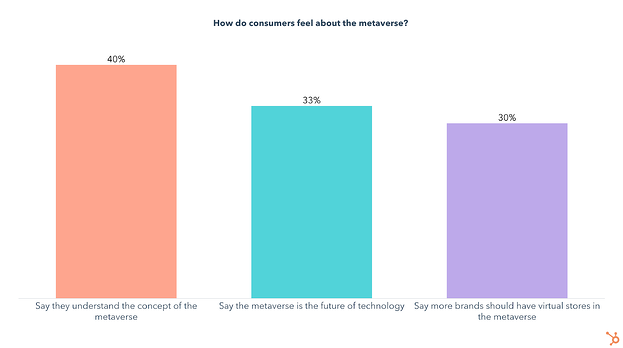
While only a small percentage of people have stepped into the metaverse, half of those that have did so in the past three months.
On top of that, these early adopters aren’t just popping in once to check it out – they’re actually invested in these virtual worlds. Of those who have ever used the metaverse:
- 64% own virtual currency in the metaverse
- 61% own virtual items that can be bought and sold in the metaverse
- 55% own land that can be bought and sold in the metaverse
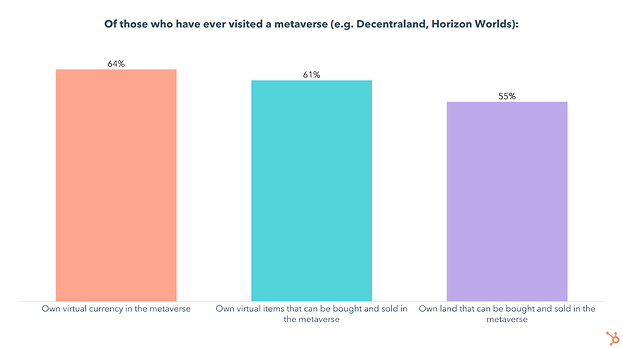
How the Metaverse Intersects With Consumers' Real Lives
We also asked those who have ever done metaverse-related activities (visited a metaverse, played online games, attended virtual events, or bought virtual items/NFTs) about how these intersect with their “real” lives, which produced some surprising results:
- 60% say their virtual items are just as important as their real-life possessions
- 54% say their online relationships are just as important as in-person relationships
- 51% say they can more easily be their authentic self in virtual worlds than in-person
- 40% say they understand the concept of the metaverse
- 33% say the metaverse is the future of technology
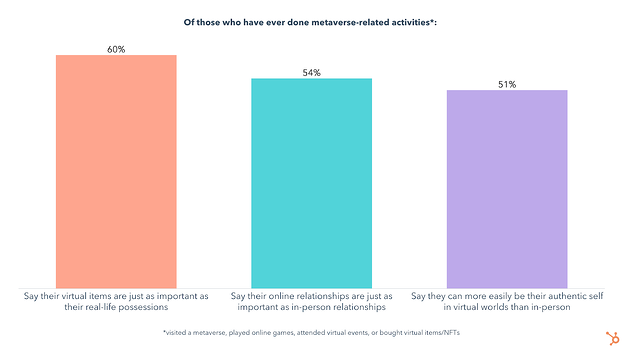
Who's using the Metaverse?
Our research shows that opinions on the metaverse differ sharply by age group.
At the moment, Gen Z and Millennials are the most excited about exploring the metaverse, with around 15% of them having visited a metaverse at some point.
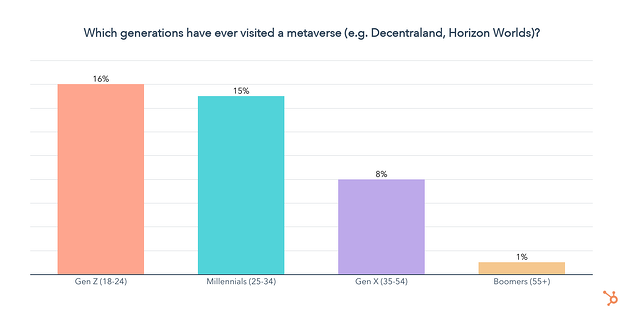
Gen Z and Millennials are also more likely than any other generation to have done metaverse-related activities, other than buying crypto (likely due to Gen Z having less disposable income):
- 40% of Gen Z/Millennials have played an online game
- 28% of Gen Z/Millennials have used a VR headset
- 22% of Gen Z/Millennials have bought virtual items other than NFTs or crypto, like a skin in a video game
- 18% of Gen Z/Millennials have attended a virtual reality event
- 23% of Gen Z/Millennials have bought cryptocurrency
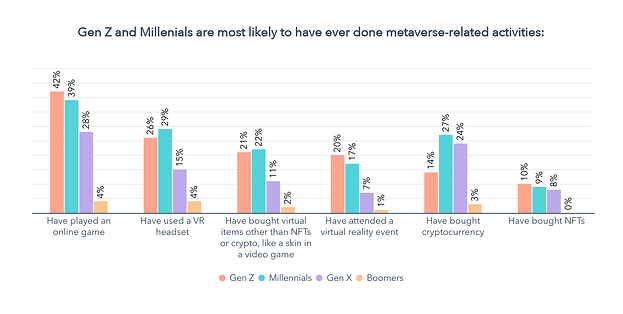
So now that we know Gen Z and Millennials are the primary users of the metaverse and related technology, let’s take a look at why people go to the metaverse in the first place.
What Do People Do In the Metaverse?
Why People Visit the Metaverse
The most popular reasons for visiting the metaverse are to play games, hang out with friends, work a virtual job, and for virtual meetings and events.
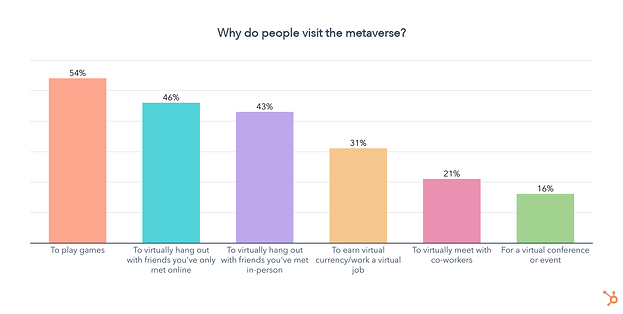
Keep in mind the metaverse is all about empowering users to create their own experiences. As people continue innovating in virtual worlds, the number of activities and use cases will likely grow.
What motivates metaverse regulars?
Because the metaverse itself is loosely defined, to some extent it's up to the users to shape its future. And those users are invested, with over 50% owning virtual currency, land, and items that can be bought and sold in the metaverse.
Additionally, with 31% of metaverse users saying they log on to earn virtual currency or work a virtual job, it's important to touch on another selling point of the metaverse – users can earn currency by playing games or working virtual jobs.
We asked the general population whether they would be more likely to use a platform if they got virtual currency as an incentive, and 27% say they would. This number jumps up to 36% for Gen Z and 40% for Millennials.
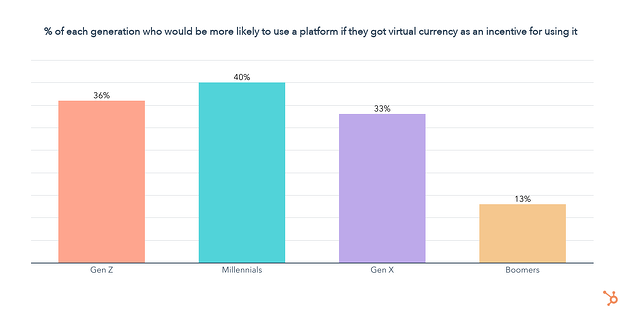
On top of that, 60% of those who have ever used the metaverse say they would be more likely to use a platform if they got paid in virtual currency.
Offering incentives for using a platform can also help address a problem many marketers are currently struggling with – gathering consumer data in a way that provides value to both parties.
The Most Visited Metaverses
The Sandbox, Meta’s Horizon Worlds, and VRChat are the most visited, followed by Axie Infinity, Decentraland, and Illuvium. Keep in mind that many of these worlds are in early development, and some aren’t even accessible to the public yet. 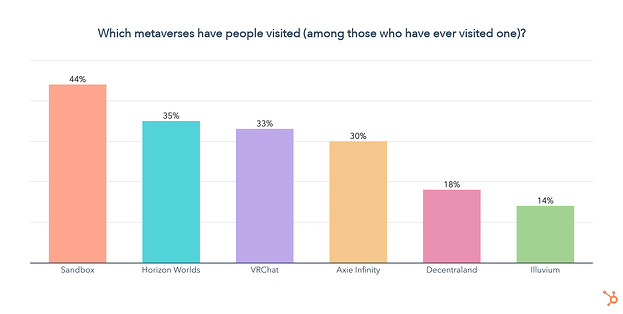
Data Privacy and the Metaverse
Currently, many platforms like social media track, analyze, and sell personal data, but the user gets nothing in return. In response to this, privacy protections are being developed by governments and corporations alike to give consumers more power over their data.
This means offering incentives for people to not only spend time on your platform but also share their data will become more important in the future.
So let’s take a closer look at how consumers currently think of data privacy, and whether they think the metaverse has the potential to tip the scales in their favor.
Consumers are unified in their demands for ownership over their personal information. Our survey found that:
- 80% of consumers agree that data privacy is a human right
- 80% of consumers agree that they should have complete control over how companies use their data
- 79% of consumers say they are concerned about how companies use their data
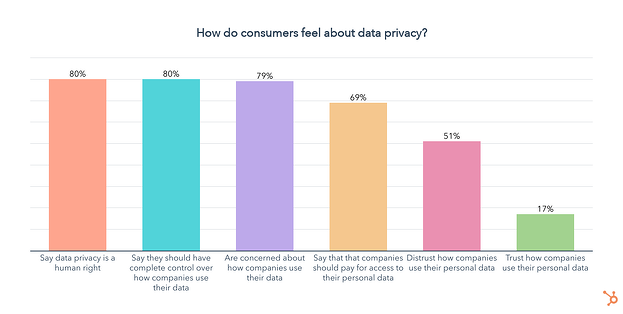
On the other hand, when it comes to the metaverse, 53% of those who have ever used it say they trust how data on their activities in virtual worlds will be stored and used, while 29% distrust it. This is quite fascinating as many metaverses are decentralized, built on relatively emerging blockchain technology, and still a mystery to many — even when they've visited them a few times.
What’s Next for the Metaverse?
So you might be wondering what to expect next for the metaverse, and in all honesty, nobody knows.
We’ll keep running our Consumer Trends Survey regularly, to stay up to date on all the latest trends, from the metaverse to social media, workplace trends, and much more.
In the meantime, check out our State of Consumer Trends Report which includes the full results of our survey, as well as the downloadable PDF below.
![What Consumers Think About the Metaverse & What Brands Need to Know [New Data]](https://localseoresources.com/wp-content/uploads/https://no-cache.hubspot.com/cta/default/53/ebf9ec8e-a468-455a-943e-80aa4e6be694.png)






Recent Comments